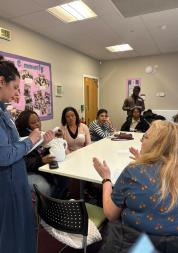Maternity care for asylum-seeking and migrant women in south east London

This research project used a peer research model to understand the maternity care experiences of migrant and asylum-seeking women and birthing people living and using services in south east London. We found the experiences of migrant and asylum-seeking women and birthing people often marked by variations in care and barriers to access. This group of women and birthing people encounter challenges related to language and communication, limited understanding of the healthcare system and entitlements, inconsistent access to antenatal and postnatal care, and a general lack of culturally sensitive and linguistically appropriate services. The impact of these barriers can lead to delays in seeking care, incomplete care, and the potential for increased health risks for both mothers and their newborns.
Our co-researchers all lived in the six boroughs of south east London, and had both recent experience of using maternity care services and recent experience of migrating to the U.K. Co-researchers were important partners in this research study, contributing to the design and development of the project, reaching out to their peers, and conducting 24 interviews to explore maternity care experiences among migrant and asylum-seeking women.
Key Findings:
- Quality of care: The research identified a mixed experience regarding the quality of care provided by services. While some praised the compassion and support of health and social care staff, particularly midwives, others experienced what they felt were discriminatory differences in treatment based on their ethnic backgrounds and migration status.
- Perceptions of maternity services: Before migrating to the U.K., women had high expectations of NHS maternity services and the health system more broadly. Many found these expectations unmet, with care and treatment falling well below expectations and anticipated levels of care and support.
- Access to care: Access to maternity care for migrant and asylum-seeking women was shaped by ambiguity regarding healthcare costs and entitlements. Immigration status affected eligibility for welfare benefits and the ability to work, leading to financial insecurity.
- Postnatal experiences: Caring for newborns was demanding and overwhelming, particularly for migrant and asylum-seeking women who lacked traditional support systems to help manage these new responsibilities.
- Support networks: The networks of support found in partners, friends, and family are crucial as a source of pregnancy/baby advice and information in addition to providing emotional and physical support for migrant and asylum-seeking women and birthing people. In the absence of these networks, women found themselves isolated and struggling to manage the demands of pregnancy and young children.

